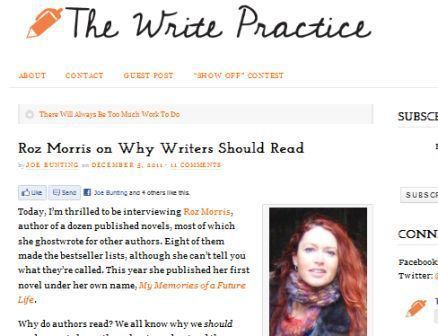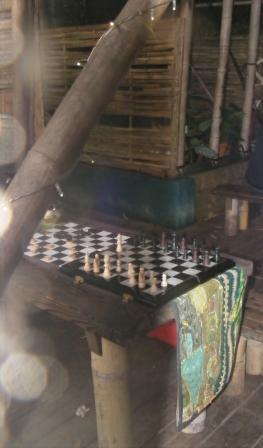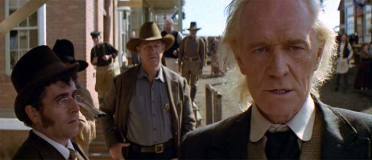Roz Morris's Blog, page 103
December 6, 2011
'If I'm writing fiction there must be music… invasive music to kick me in the heart' – Nicola Morgan on The Undercover Soundtrack
 My guest this week on The Undercover Soundtrack is award-winning author Nicola Morgan, who has around 90 published titles to her name. She's talking about how music has long been her muse for writing – including the undercover influences for her latest release Mondays are Red.Come on over…
My guest this week on The Undercover Soundtrack is award-winning author Nicola Morgan, who has around 90 published titles to her name. She's talking about how music has long been her muse for writing – including the undercover influences for her latest release Mondays are Red.Come on over…








December 5, 2011
Finding your muse in a book – Joe Bunting asks me why writers should read
 What are you reading? Are you reading it for your writing or for your soul? Is there a difference? Should there be? What books did I read to teach me how to write? And what is 'passive Graham Greene'?
What are you reading? Are you reading it for your writing or for your soul? Is there a difference? Should there be? What books did I read to teach me how to write? And what is 'passive Graham Greene'?








December 4, 2011
Should I write a memoir, a novel or a fictionalised memoir?
 If you want to write a book from your life experiences, which is the best option? I've had this rather interesting question…
If you want to write a book from your life experiences, which is the best option? I've had this rather interesting question…
I've spent a considerable amount of time working across the globe as a freelance soldier. I am committing my adventures to text to shine a light on the realities of that world. Far from the blood and gore of Tony Geraghty's Guns for Hire, I want to explore the personal torment so many go through and the struggles they face in balancing domestic life and freelancing. Would this be better written as a personal recollection or a novel like Lee Childs's Jack Reacher series?- Michael
My first reaction is, can I be your agent? Wow, what a story. Not many people who offer themselves to the publishing world have such a unique premise. You should definitely write a memoir first. If it does very well, you'll find yourself asked to write novels anyway. Many successful publishing careers have started with a best-selling memoir – although, of course, there are many memoirs published that don't hit the big time.
If you have ideas for novels, work them up too to demonstrate that you can be a long-term investment. (If you haven't, it's not a deal-breaker. If they're really keen they'll send you to someone like me  )
)
Are you legally allowed to write it?
Make sure you're allowed to write this book. In your case it sounds as though you want to focus on the personal story rather than operational details. But many writers with dynamite memoirs can't publish because of libel laws, the Official Secrets Act or possible death threats.
Libel is when you harm a person's reputation. You can relate events if you can prove they're true. If you're delving into people's motives you have to be careful, or get the subject's permission. But don't let this scare you – people do write quite searching, searing memoirs. Just make sure you're fully informed.
Publishers will not protect you
Writers often think that if they have a publisher to hide behind, it will protect them. It won't. Although publishers have lawyers they can show manuscripts to, they usually only do that with the famous or infamous – otherwise it's not worth paying the fees. (Sorry.) Publishing contracts always have a clause that makes you responsible for any harm (ie legal harm) caused by your book. Even if it's only a twinkly fairy tale.
Be honest – do you want to be honest?
Are you willing to write honestly and fully about the experience? This is going to be a story about the effect on your family and friends. They won't all be angels – and if they are, the book won't ring true. Will they mind if you peel them in public?
I've seen many manuscripts from writers who are examining traumatic periods from their lives. While they delve truthfully into their own hell and bad behaviour, they balk at doing the same to their loved ones.
We novel-writers are frequently asked by friends or family if we've put them into books. If we deny it, they often don't believe us. In a memoir there is no cloak of fictionality. They know, without doubt, that you did.
Should you write a fictionalised memoir?
This is the hybrid option – not quite truth, not fully invented. You take a real experience apart and make a story that is true in essence, even if not keeping to the precise detail.
I get approached by a lot of people who want to write about a major change in their lives, such as unusual travel experiences or giving up a high-flying career to start anew in a foreign country. Speaking with my cruel marketing hat on, these are not as unusual as Michael's story. It's probably better to mine them for a novel instead, where you have licence to make something bigger and more distinctive than reality. In that case fictionalised memoir might be a good option.
From the moment you cross into fiction, fiction rules apply. Start with what really happened, but do not shrink from adding, cutting and inventing until you have the best story and the most usable characters. What's the difference between that and 'real' fiction, if there is such a thing? Probably not much.
Huh?
Fictionalised memoir is mainly a label to get more attention in an overcrowded market. It says 'this is a story, but it is written from what I truly lived'. Some readers like that; some are profoundly irritated and want either truth or fiction. They certainly don't want to question whether you made the best bits up.
Attention!
The problem with being a debut writer is getting attention. Readers – and publishers – buy the author's story as much as they buy the book. For that there's a pecking order.
1 – Memoirist – translates as 'read my book because this is my extraordinary life and it's fascinating'
2 – Fictional memoirist – 'read my book because it's fiction based on my inimitable experiences'
3 – Novelist – 'read my book, I made it up from extensive research, the depth of my human understanding and the pure dedicated application of my craft'
Believe me, it hurts to write that list. It's not a comment on quality, simply on the volume of writing that is out there.
The bottom line
Memoir comes with the marketing built in. If you have enough usable material to write a straight memoir, go with the memoir. You'll start at the top of the debut writers' pecking order.
You guys may, of course disagree! What would you tell Michael? Share in the comments!
How to write a novel – in-depth webinar series with Joanna Penn of The Creative Penn. Find more details and sign up here.
I have tools for writing novels in Nail Your Novel – my short book about how to write a long one –available from Amazon.My own novel, My Memories of a Future Life is now available. You can also listen to or download a free audio of the first 4 chapters over on the red blog.








November 30, 2011
'Music is a trigger that lets me see a living person in my mind' – Teresa Frohock on The Undercover Soundtrack
 My newest guest on The Undercover Soundtrack is Teresa Frohock. Come over to the red blog, where she talks about bringing life to Miserere: An Autumn Tale
My newest guest on The Undercover Soundtrack is Teresa Frohock. Come over to the red blog, where she talks about bringing life to Miserere: An Autumn Tale








November 27, 2011
Finishing your draft? Don't open it again until Christmas
 On November 30th Nanowrimoers will be typing 'The End'. Whether you're a Nano or not, the next thing you must do is put the manuscript away. Close the file, stow the notebooks, do a happy dance. Unless you have a deadline that demands you thrash it into shape straight away, don't touch it for at least a month.
On November 30th Nanowrimoers will be typing 'The End'. Whether you're a Nano or not, the next thing you must do is put the manuscript away. Close the file, stow the notebooks, do a happy dance. Unless you have a deadline that demands you thrash it into shape straight away, don't touch it for at least a month.
Become a stranger to your story
We all know how we can read a page over and over and somehow miss the appalling typo in the first sentence. When we're too tangled in a novel we see what we think is there – not what is actually on the pages.
To do useful revision work, you need to allow enough time for your novel to become unfamiliar – so that you're no longer thinking like its writer, but as a reader.
Let the flavours marinate
Your manuscript needs to marinate. Like a good wine, all that stuff you put in has to blend. A novel isn't just characters + plot + description + setting + dialogue + cool bits + pizzazz + your undercover soundtrack, if you do that. It's all those things working together.
Put more sensibly, your characters are not just characters. They are people in a world, with forces they are fighting, with people who embody their worst fears or their happiest hopes. The world and the plot are personal challenges to them, not just places to go and stuff for them to do.
If you look at your manuscript too soon, you'll only see the separate ingredients. Not how they work together. You won't see the parts where you were cleverer than you thought – or the overall patterns that you could amplify. You'll miss the things you unconsciously wrote that echo higher themes, or create an overall symmetry to the story.
But I have things I want to fix right now
Make notes about them, but don't do them yet. When you look at the manuscript afresh, you might have better ideas for how to tackle them.
But I was on a roll and I don't want to stop
Nobody says that when your manuscript is resting you have to stop writing. Go and tinker with another story. If you've done Nanowrimo to kick-start a writing routine, use the time for reading and research. Stephen King in On Writing says to leave the manuscript for at least six entire weeks – and to work on something totally different to give yourself time to recharge.
Revise in haste, repent at leisure
If you revise too soon, you'll only scratch the most obvious itches. You'll miss so much more.
So close the file. Don't touch it at least until Christmas.
(Thanks for the pic Svadilfari)
What's the longest you've left a manuscript before revising it?
How to write a novel – in-depth webinar series with Joanna Penn of The Creative Penn. Find more details and sign up here.
I have tools for assessing manuscripts in Nail Your Novel – my short book about how to write a long one –available from Amazon.
My Memories of a Future Life is now available in full. You can also listen to or download a free audio of the first 4 chapters over on the red blog.








November 23, 2011
New on The Undercover Soundtrack – Erika Marks
 My latest guest on The Undercover Soundtrack is Erika Marks. Samba over to the red blog to hear about the music that smoked and smouldered through her New Orleans romance, Little Gale Gumbo
My latest guest on The Undercover Soundtrack is Erika Marks. Samba over to the red blog to hear about the music that smoked and smouldered through her New Orleans romance, Little Gale Gumbo








November 20, 2011
Living the stuff of novels… the ghostwriter's lot
 Flying planes, beating up drug barons, underwater fighting… Today I'm at Do Authors Dream of Electric Books, musing about the curious business of ghostwriting, and pretending to have lived someone else's life of high adventure…
Flying planes, beating up drug barons, underwater fighting… Today I'm at Do Authors Dream of Electric Books, musing about the curious business of ghostwriting, and pretending to have lived someone else's life of high adventure…








November 19, 2011
I self-published – should you too?
 'Are you glad you self-published your novel?' said Stacy Green to me, in the secret passages of Twitter.
'Are you glad you self-published your novel?' said Stacy Green to me, in the secret passages of Twitter.
'Totally,' I replied. Although I would say that, wouldn't I?
Stacy replied: 'I'm in the early query process and wondering if I'm making a mistake.'
'Stacy, I think you should carry on querying.'
An answer that might sound like I'm being disloyal to the indie cause. But here's my reasoning.
But why????
It's early days yet for Stacy. Yes, querying is wearying, but it's the way to tell if your novel is up to professional standard. Yes, it may take a ridiculous while before you get a reply – publishing turnaround is like sending messages to the distant reaches of the solar system.
I still believe everyone should try to get representation first, if they've never been published before or don't have a ready-made audience.
Never forget, writing is a self-taught art. There is so much to get right in a novel and so many ways we can be blind to our book's faults. This is entirely understandable. You remember when your novel was a scrap of paper with just one idea. You remember learning, from the bootsoles up, how to make it into a novel. You've quarried for depth, trampled the rough spots and polished over and over. You've developed brilliant and stylish marks of your individuality as well. Compared with when you started, you now feel like an expert – everyone does. Now, you need outside, experienced input.
You can of course hire an editor, and an editor who is a good fit for you can certainly give you a lot of help and guidance. You can trade with beta readers. But the final book is down to you. If you want to cut it in the marketplace, you have to try in the marketplace. And that generally means seeking representation – or publication via the smaller presses. (Although why would you aim small to start with?)
Rejections
Yes, you may be rejected because your book is unusual, or an unfashionable genre. But if you made the grade, the rejection will tell you this – even if it's just a few short lines. They always do. If you're getting form rejections or never hear back, you probably still need to do some work. And that tells you you shouldn't self-publish. Of course it does.
Waiting for this feedback takes a long time. But while you're waiting, get started on another book. You'll need it sooner or later. And aren't you itching to put all you learned into practice?
Me, me, me
I didn't self-publish until my novel had wooed an agent. (I didn't have an agent for my ghosting). She took my novel around the publishers, who said 'it's fascinating but we don't know how to sell it'. At that stage, I could have left it locked behind the gatekeepers' portcullis, or changed it into a conventional thriller (some of the feedback I got). I wasn't having that.
Am I glad I self-published? More than I ever imagined. Every word of feedback from readers brings my novel to life and gives it a place in the world. For which, thank you.
But going it alone means doing all the selling. That's no bed of roses. It is much harder for me to prove the book's worth. If you have an audience amassed, no problem. Few of us do, so we rely on reviews to spread the word to new readers. Ideally we want to be reviewed alongside traditionally published novels that would be next to us in a shop. But it's not a level bookshelf. Indies are still regarded sniffily in most quarters. (One review I did get, on For Books' Sake, said My Memories of a Future Life was 'so original and odd it's in a class of its own'. I'm going to put that on a T-shirt, of course – but artistic pride aside, how does anyone sell a book like that? No wonder publishers wanted it tamed. Still, that's my problem now.)
New authors, I urge you to test your book in the market first. If you get an offer and you don't like it, you can always turn it down.
Indie publishing isn't for people who couldn't get published or represented. It's for people who could.
(Thanks for the pic, Muckster)
 How to write a novel – in-depth webinar series with Joanna Penn of The Creative Penn. Catch up on the first seminar and sign up for the rest. Find more details and sign up here.
How to write a novel – in-depth webinar series with Joanna Penn of The Creative Penn. Catch up on the first seminar and sign up for the rest. Find more details and sign up here.
Nail Your Novel – my short book about how to write a long one – is available from Amazon.
My Memories of a Future Life is now available in full. You can also listen to or download a free audio of the first 4 chapters over on the red blog.








November 16, 2011
New on The Undercover Soundtrack… Nick Green. And Vangelis
 My guest today on The Undercover Soundtrack is Nick Green, author of the MG novels The Cat Kin and Cat's Paw, from Strident Publishing – come over to hear how one pivotal song magicked up an entire novel…
My guest today on The Undercover Soundtrack is Nick Green, author of the MG novels The Cat Kin and Cat's Paw, from Strident Publishing – come over to hear how one pivotal song magicked up an entire novel…








November 13, 2011
Foreshadowing: how a sore thumb can prepare you for a brutal beating
 I have a soft spot for hypnotists, as anyone who's read My Memories of a Future Life will readily believe. Required viewing in our house is the illusionist Derren Brown – and part of the fun is how he puts a show together as a story.
I have a soft spot for hypnotists, as anyone who's read My Memories of a Future Life will readily believe. Required viewing in our house is the illusionist Derren Brown – and part of the fun is how he puts a show together as a story.
In the first show of his latest series, The Experiments, he tested whether a nice ordinary bloke could be conditioned to assassinate a celebrity – and then, like the man convicted of shooting Robert Kennedy, have no memory of doing the deed.
It's a lot to believe, for both volunteer and viewer. There were the obligatory demonstrations. We saw the lucky chap develop super-marksmanship under hypnosis. He was put in a trance and did things he couldn't remember.
But he could have been faking, of course. So before any of these demonstrations were done, the audience had to be primed to believe they could be true.
With some nifty foreshadowing.
Foreshadowing, sometimes known as prefigurement, is a way of suggesting developments that may happen later in a story so that the reader is more ready to accept them.
1 Foreshadowing amnesia
Derren mentioned moments of amnesia we all naturally have – driving a familiar route and not remembering the journey, or if you locked the front door. Hey presto, amnesia is something that could happen to us all.
This is what a writer might do if a story pivoted on an event the reader might find hard to believe if confronted with it cold.
Imagine a story that revolves around mistaken identity. Before you see the actual mistake, the ground is prepared obliquely. So a man meeting his wife off the train might hug the wrong woman, fooled by her coat. Or two characters might talk about a situation where a friend got in the wrong car. You think the scene's about something else – perhaps their friendship – but it plants the seed that mistaken identity could happen to anyone. So when later it does, it's easier to swallow.
swallow.
2 Foreshadowing the killer tr ance
The assassin in Derren's experiment was activated when he saw polka dots. This was demonstrated in action a few times. But before all that, we were primed too.
While Derren was describing what witnesses saw when Kennedy was shot, he mentioned a woman in a polka-dot dress. It seemed like one of those details to make the story more vivid, as insignificant as what time it was or whether canapes were served. Until he introduced his visual trigger later in the show – polka dots. On a handkerchief. As a surprise picture on the inside of a restaurant menu.
Now we remembered they were associated with something sinister. And in the climax, they appeared on a dress…
And the sore thumb?
In Clint Eastwood's film Unforgiven, a blacksmith remarks that if you whack your thumb in cold weather it hurts a lot more. Not long afterwards, on an icy cold day, Little Bill gets in a fight with English Bob. But this is more than Little Bill playing football with English Bob, we're primed to feel the pain of the blows. Unforgiven is a world where everything is a struggle, where people are fragile. And a sore thumb tells us a kicking is really nasty.
Skilled storytellers don't leave your reaction to chance. More often than you think, they're planting clues to finely control the way you feel.
As always, give me examples you've noticed! Or used in your own fiction
 Starts November 14: How to write a novel – in-depth webinar series with Joanna Penn of The Creative Penn, starting November. Find more details and sign up here.
Starts November 14: How to write a novel – in-depth webinar series with Joanna Penn of The Creative Penn, starting November. Find more details and sign up here.
Nail Your Novel – my short book about how to write a long o ne – is available from Amazon.
My Memories of a Future Life is now available in full. You can also listen to or download a free audio of the first 4 chapters over on the red blog.











